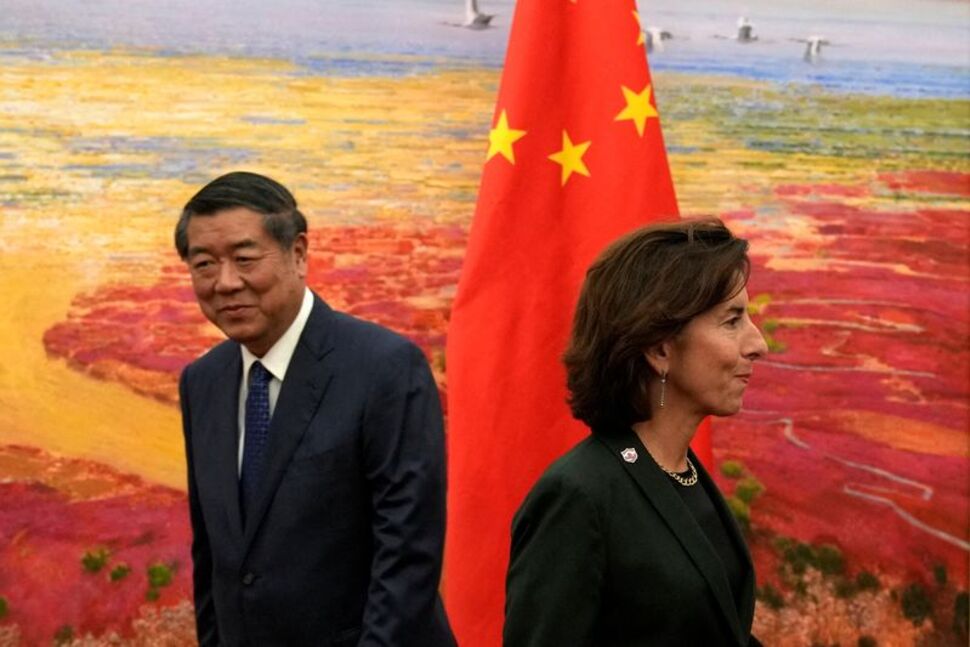US Commerce Secretary Gina Raimondo has raised concerns covering a vast spectrum of sensitive bilateral issues on her Chinese visit – from firms caught in the “chip war” to climate change and artificial intelligence.
The latter two problems were mentioned during a meeting late on Tuesday Raimondo had in Beijing with Chinese Premier Li Qiang.
“There are other areas of global concern, such as climate change, artificial intelligence, the fentanyl crisis, where we want to work with you as two global powers to do what’s right for all of humanity,” Raimondo said at the Great Hall of the People.
Raimondo is the latest Biden administration official to visit China in a bid to strengthen communications, particularly on the economy and defence, amid concerns that friction between the two superpowers could spiral out of control.
ALSO SEE: Chinese Investors Ploughing Into Foreign Assets Via ETFs, QDII Scheme
Li said sound economic relations and trade cooperation would be beneficial not only to their countries but also to the whole world.
The United States and China used to be each other’s largest trading partners but Washington now trades more with neighbours Canada and Mexico, while Beijing deals more with Southeast Asia.
On Monday, Raimondo discussed problems of US chipmakers Intel and Micron with Chinese Commerce Minister Wang Wentao.
She also discussed restrictions that China has imposed on gallium and germanium exports in wide-ranging and candid discussions with Wang, who she met with for more than two hours, and then a further two hours when they had lunch.
Raimondo said in May the United States “won’t tolerate” China’s effective ban on purchases of Micron Technology memory chips and is working closely with allies to address such “economic coercion.”
Earlier this month, Intel terminated its $5.4 billion acquisition of Tower Semiconductor, after failing to secure approval from China’s State Administration for Market Regulation.
Consultation mechanism to discuss commercial issues
US firms have reported growing challenges with operating in China, which has sharply criticized US efforts to block its access to advanced semiconductors.
And in July, China – the world’s top germanium producer accounting for more than 60% of global supply – announced restrictions on the export of eight gallium and six germanium products, which are used to make semiconductors, effective from August 1, citing national security reasons.
Given these tensions, it is perhaps not surprising that both sides agreed on Monday to create a new formal working group on commercial issues.
The commercial issues working group is a consultation mechanism involving US and Chinese government officials and private sector representatives “to seek solutions on trade and investment issues and to advance US commercial interests in China,” Raimondo said.
The United States and China also agreed to convene subject matter experts from both sides for technical discussions “regarding strengthening the protection of trade secrets and confidential business information,” she said.
The trip would have wide benefits for American business operating in China, she said. “We’re delivering. We will have that formal communication.”
Xie Feng, China’s envoy to the United States, welcomed the announcement.
Raimondo and Commerce Minister Wang Wentao had “rational, candid and constructive communication” on China-US economic and trade ties and issues of common interest, Xie said in a post on X, formerly called Twitter.
From Shanghai to Beijing
The first meeting of the initiative was held on Tuesday at the Commerce ministry in Beijing, led by Matthew Axelrod, US assistant secretary for export enforcement, the department said.
Such an exchange offered a platform to reduce misunderstandings of US national security policies, Raimondo said on Monday, but added, “We are not compromising or negotiating on matters of national security. Period.”
On Tuesday, Raimondo travelled from Shanghai to Beijing for talks with Chinese Vice Premier He Lifeng, during which she stressed that the United States does not seek to decouple from China.
The Commerce Secretary’s trip comes at a time of serious friction between the world’s two largest economies and she appears to be making a big effort to repair business ties. which have been badly shaken over recent years.
“While we will never compromise in protecting our national security, I want to be clear that we will never seek to decouple or hold China’s economy back,” Raimondo said during opening remarks in Beijing’s Great Hall of the People.
A confidant of President Xi Jinping, He took up the post of China’s economy tsar in March, having earlier run the powerful state planner.
Tourism summit planned in first half of 2024
Earlier on Tuesday, Raimondo and Tourism Minister Hu Hepin agreed to hold the 14th China-US Tourism Leadership Summit in China in the first half of 2024.
The step aimed to further revive and develop tourism co-operation between the two nations, the Commerce Department said in a statement.
The last such summit was held in 2019 in Seattle. Before that, it had met every year, alternating between the countries.
Raimondo has made boosting travel and tourism a big part of her trip.
This month, China and the United States agreed to double the number of flights permitted between them, which are still only a fraction of the number before the pandemic.
If China returned to 2019 US tourism levels, that would add $30 billion to the US economy and 50,000 US jobs, Raimondo said.
On Wednesday, Raimondo plans a visit to Shanghai Disneyland, a joint venture of Walt Disney and Chinese state-owned Shendi Group.
- Reuters with additional editing and reporting by Jim Pollard
NOTE: This report was updated with new details and the headline amended on Tuesday August 29, 2023.
ALSO SEE:
China Seen Blocking US Chip Giant’s $5.4bn Merger With Tower
China Stalling Merger Reviews of US Chip Firms, Others – WSJ
China’s Gallium Curbs a Headache for EV Carmakers
Curbs on Chipmaking Metals ‘Just The Beginning’, China Warns
China’s Micron Ban Adds to Asian Chipmakers’ Investment Woes
























